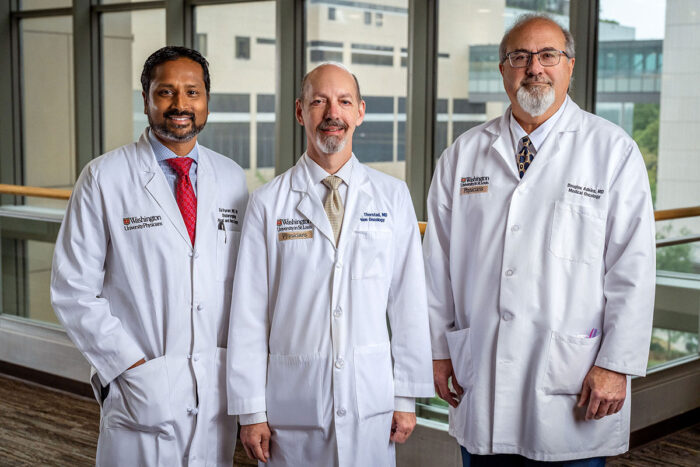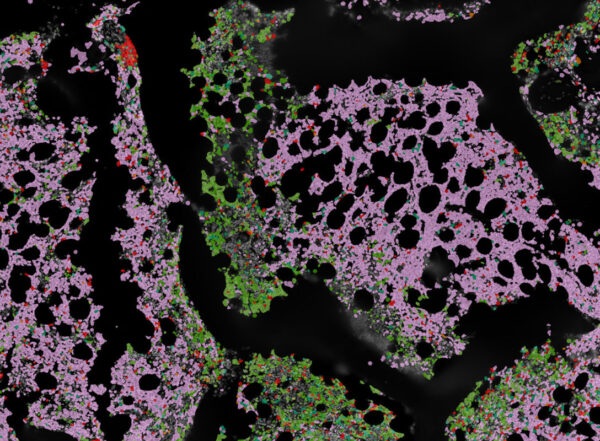Comprehensive Head & Neck Tumor Center established at Siteman Cancer Center
Washington University physicians provide multispecialty, cutting-edge, expert care to patients while advancing the field through innovative research
 Splycehouse
SplycehouseSiteman Cancer Center has established a Head & Neck Tumor Center at Washington University School of Medicine in St. Louis and Barnes-Jewish Hospital. The center's co-directors are, from left, Sidharth Puram, MD, PhD; Wade Thorstad, MD; and Douglas Adkins, MD.
Washington University School of Medicine in St. Louis and Barnes-Jewish Hospital, a member of BJC HealthCare, have established a comprehensive Head & Neck Tumor Center, a collaborative, multispecialty practice of Washington University physicians and researchers whose mission is to provide cutting-edge care for patients with head and neck cancers as well as benign tumors and masses of the head and neck. Among the first of its kind in the country, the Head & Neck Tumor Center emphasizes individualized, patient-centered care with complementary research programs that have the potential to transform patients’ treatment and improve their outcomes.
Based at Siteman Cancer Center at Barnes-Jewish Hospital and Washington University School of Medicine, the center is co-led by three Washington University physicians: Sidharth V. Puram, MD, PhD, an associate professor of otolaryngology — head & neck surgery; Douglas R. Adkins, MD, a professor of medicine in the oncology division in the Department of Medicine; and Wade L. Thorstad, MD, a professor of radiation oncology in the Department of Radiation Oncology.
Siteman Cancer Center is a National Cancer Institute (NCI)-designated Comprehensive Cancer Center. Siteman is Missouri’s only NCI-designated Comprehensive Cancer Center and the state’s only member of the National Comprehensive Cancer Network.
“We are at a critical crossroads in the treatment of head and neck tumors,” said Puram, also chief of head & neck surgery in the Department of Otolaryngology — Head & Neck Surgery at Washington University. “As these tumors continue to become more common, we are developing newer and more advanced technologies to better manage and treat them. We are constantly improving techniques to minimize the side effects of surgery and radiation, for example, while maximizing patients’ ability to go about their normal lives after treatment. This new center will help us integrate the wide-ranging expertise that is critical to providing the best possible care for these patients.”
The new center is timely, as diagnoses of head and neck cancers are on the rise for multiple reasons — in large part, due to the increasing incidence of human papilloma virus (HPV) infection, which is sexually transmitted and a known cause of these cancers. Smoking and alcohol exposure also increase the risk of developing head and neck cancer.
“Our clinicians and researchers at the Head & Neck Tumor Center are dedicated to the development of new treatments that have the potential to improve outcomes and quality of life for patients with tumors of the head and neck,” said Timothy J. Eberlein, MD, director of Siteman Cancer Center, and the Spencer T. and Ann W. Olin Distinguished Professor. “The leaders of this center are committed to excellence in patient care and research, and this new center will provide multi-disciplinary teams to deliver outstanding care, giving hope to patients and their families.”
The center’s team will include physician specialists in otolaryngology, medical oncology, radiation oncology, neurosurgery, ophthalmology, vascular surgery, thoracic surgery, plastic surgery, palliative care, endocrinology and radiology.
“The Head & Neck Tumor Center brings together a team of experts dedicated to providing extraordinary care to every patient,” said John Lynch, MD, president of Barnes-Jewish Hospital. “Thanks to collaboration between Washington University School of Medicine and BJC HealthCare, Siteman Cancer Center is able to deliver the latest innovations and treatments, as well as pursue groundbreaking research that will impact cancer care for generations to come.”
The center will emphasize equitable access to care for all patients, whether from under- or well-resourced communities. As part of that commitment, the Head & Neck Tumor Center employs patient navigators to provide support and guidance to patients as they manage the complexities of the treatment regimens for these tumors.
Patients at the center will have the opportunity to participate in clinical trials of investigational therapeutics for head and neck cancer at Siteman, including major national or international trials.
The center’s experts are leaders in innovative surgical techniques, including robotic surgery, minimally invasive surgery, and advanced plastic and reconstructive surgery. If patients give permission, the center will sequence the genetic material of their tumors to uncover and profile the unique genetic errors and changes in gene expression that may contribute to head and neck tumors. Researchers also can analyze the immune profile of the tumor to determine if it might be susceptible to new treatments such as immunotherapy or targeted therapy. Although using these approaches in the clinical setting is still a developing area of work, such information eventually could assist in making treatment plans for individual patients and lead to entirely novel avenues of research aimed at finding new and better ways to treat head and neck tumors.
Tumors of the head and neck comprise a wide variety of conditions, both benign and cancerous. The center will provide multidisciplinary care for oral cavity tumors of the mouth and lips; throat cancers; tumors of voice box, nasal cavity, and sinuses; salivary gland tumors; thyroid and parathyroid masses and tumors; skin cancers of the head and neck, including melanoma, basal cell carcinoma, squamous cell carcinoma and others; tumors of the nasopharynx, skull base, esophagus, and eye; and rare head and neck sarcomas and lymphomas.
The locations of head and neck cancers often mean the tumors themselves as well as the therapies used to treat them can cause long-term and sometimes permanent changes to a patient’s appearance and facial movements as well as to speech, the ability to swallow, and the senses of taste, smell, hearing and vision. Because these types of changes can influence core aspects of identity, the center includes experts who can help patients navigate these kinds of challenges after treatment. Such specialists include psychologists, social workers, dentists, oral surgeons, prosthodontists, speech pathologists and nutritionists.
To make an appointment at the Head & Neck Tumor Center or to refer a patient, please contact the Siteman Patient Care Coordination Center at 1-800-600-3606 toll-free from 8 a.m.-4:30 p.m. CT weekdays, or request an appointment at https://siteman.wustl.edu/request-an-appointment/.






